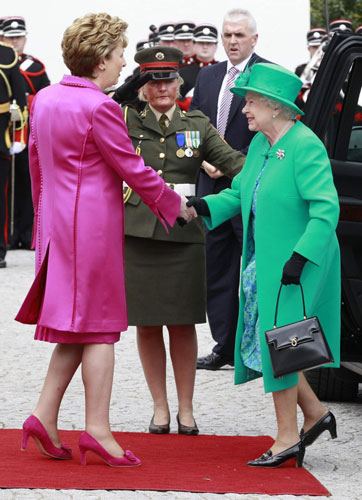Global General
Queen lands in Ireland to celebrate peace
(Agencies)
Updated: 2011-05-17 20:07
 |
Large Medium Small |
 |
|
Ireland's President Mary McAleese (L) welcomes Britain's Queen Elizabeth at her residence during the Queen's state visit in Dublin May 17, 2011. [Photo/Agencies] |
For those opposed to the visit, police are making it extremely difficult even to protest within sight of any of the queen's engagements. Onlookers are being given few vantage points to see the queen unless they have been included in carefully vetted guest lists. Roads surrounding events are being closed even to pedestrians.
But Irish leaders said extreme security measures were necessary to ensure the success of an event that has long been envisaged as the symbolic conclusion to Northern Ireland's peace process.
McAleese said Britain and Ireland were both "determined to make the future a much, much better place."
The queen arrived a full century after her grandfather George V visited an Ireland that was still part of the British Empire.
The two countries spent decades in frosty opposition following Ireland's 1919-21 war of independence and the creation in 1922 of the Irish Free State. The predominantly Protestant territory of Northern Ireland remained in the United Kingdom.
Ireland stayed neutral in World War II and offered condolences to Germany over Adolf Hitler's death; broke all symbolic ties with Britain by declaring itself a republic in 1949; and offered sympathy and a relatively safe haven when the modern IRA in 1970 began shooting and bombing in Northern Ireland.
But after Britain and Ireland joined the European Union in 1973, and as the bloodshed in Northern Ireland spilled over into the Catholic south, the governments in London and Dublin gradually found common cause.
Their cooperation provided the essential bedrock for Belfast's Good Friday peace accord in 1998. IRA disarmament and a coalition government of the British Protestant majority and Irish Catholic minority eventually followed.
British Prime Minister David Cameron, who will arrive Wednesday in Dublin, said the success of Northern Ireland peacemaking was allowing "the natural friendship, comradeship, shared experiences and warmth that we have for each other (to) really come out." He said the queen's tour of Ireland would "be a huge step forward for that process."
While the Irish remain proud of their independence, many concede that they share much with their much bigger neighbor. Today's Ireland is home to 4.5 million residents who watch British television and newspapers daily, and shop in the British chain stores that dominate the commercial heart of every Irish city.
Many follow English and Scottish soccer with passion, traveling in their tens of thousands each weekend by plane and ferry. The English, in turn, have made the Emerald Isle a favored tourist destination.
Ireland's fearful struggle to prevent national bankruptcy - the Irish have spent three years raising taxes and cutting spending, and six months ago received a potential euro67.5 billion ($95 billion) credit line from international lenders - has found its greatest champion in Britain.
Cameron's government offered a particularly low-interest loan, declared that Ireland's revival was a strategic British interest, and has pressed other EU members to cut the Irish more slack for managing their staggering debts.
These cultural and economic ties have created what is expected to be a generally warm atmosphere for the queen despite the threat of violence from the IRA splinter groups.
Police in both parts of Ireland say they are keeping dissident operatives under close surveillance. Several have been arrested in the days leading up to the visit.
| 分享按钮 |